The reopening of the city’s senior centers this summer brought great joy and relief for many. But capacity restrictions remain in place, and staffers who work with older adults say they’re concerned about the ongoing impact the prolonged isolation may have had on members.
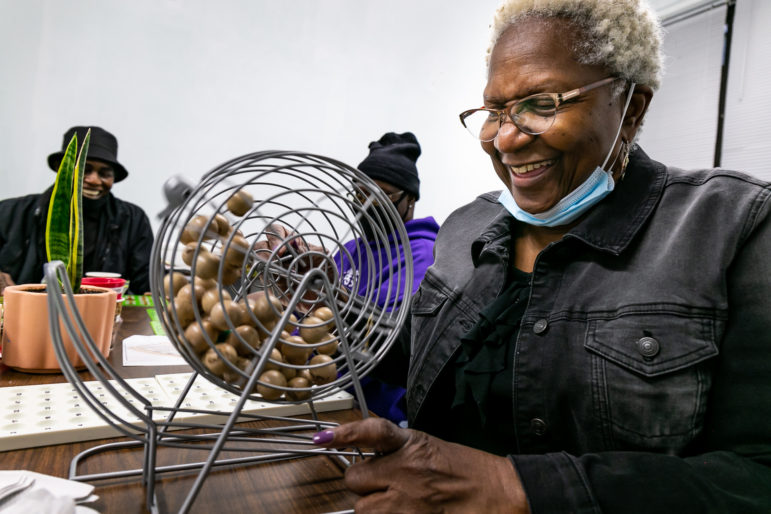
Adi Talwar
Gail Smalls, 71, calling bingo numbers at the PSS King Towers Senior Center in Harlem.One of the first things you’ll notice when you walk into the PSS King Towers Senior Center in Harlem is a decal that says, “Welcome to our home” in black cursive letters.
“We’re a family, not by blood, but just by being at the center,” said Gail Smalls, 71, one of the center’s members. And if you ask many of the others who gather there regularly, they’ll tell you that anyone who walks through that front door is family, too.
Since the city’s Department for the Aging (DFTA) allowed senior centers to resume services at 25 percent capacity in June, King Towers has started to look and feel more like its old, pre-pandemic self. Every weekday between 10 a.m. and 4 p.m., the site is buzzing with activity and life—a stark contrast from those 16 long months when its doors were shut because of the coronavirus crisis.
While senior centers citywide were quick to adapt in March of 2020—providing grab-and-go meals, offering services by phone, and eventually pivoting to virtual programming—the closures took a toll on New Yorkers who rely on the nearly 300 sites for hot meals and social interaction. That included a strain on many older residents’ mental health, as they dealt with the uncertainty and isolation that came from lockdown, according to senior center members and staffers who spoke with City Limits.
“They were banging down the door before June,” said Matthew Buletti, the director of community social services at Presbyterian Senior Services, which operates 10 centers for older adults in upper Manhattan and The Bronx. “I can’t tell you the number of times I’ve had a conversation with members asking when we were going to open. And we were sort of in this state of limbo for a very long time, particularly with the Delta variant taking off.”
The reopening of the city’s senior centers this summer brought great joy and relief for many. But things are hardly back to “normal,” as capacity restrictions remain in place, and staffers who work with older adults—social workers and case managers—say they’re concerned about the ongoing impact the prolonged isolation may have had on their members, in terms of mental health, and the acceleration of neurodegenerative diseases in some cases.
“The staff have seen a really significant change in personality. They’re just not as bubbly as before, or they’re just kind of more, you know, to themselves,” said Anya Metlitsky Herasme, director of programming for senior services at RiseBoro, which runs 10 senior centers and clubs in Brooklyn. “But then, on the other hand, we also see people who are just so relieved to be back and it just made a world of difference.”
‘We love it here’
Center staffers and members say the COVID shutdowns reinforced the important role that senior centers play in supporting older New Yorkers—a role that’s sometimes been threatened even before the pandemic by proposed city budget cuts.
King Towers was one of the 10 senior centers run by PSS in a New York City Housing Authority development that was threatened with closure back in 2019, but was later spared after the City Council’s budget allocated the $2.1 million needed to keep the sites running, and transferred management to DFTA.
“Ultimately, we were able to show them that this was still such an important place in the community,” Buletti said. “And now, looking retrospectively, if they were successful in shutting it down in 2019, what would their experience have been like with the looming pandemic?”
In 2019 and 2020, before the pandemic, the city’s 249 DFTA-funded senior centers served some 24,249 people each day, a 92 percent utilization rate, according to the Mayor’s Management Report. During the COVID shutdown, in Fiscal Year 2021—which spanned July 2020 to this past summer—2,509 older New Yorkers received mental health services through the DFTA, a more than 20 percent decrease from the year before, the same report states.
“When everything was closed, it was traumatic for us because this is where we have our second home,” said Jacob Azuke, 79, another King Towers member. He was at the center on a recent Friday afternoon, along with a about a dozen others sitting around two tables and getting ready to play a game of bingo. “Look at us, we are glad to be here. And as you can see, we love it here.”
The center’s common room is currently under renovation; absent from the walls are the works of art that members have painted over the years. On a couch next to the TV sits a poster with Polaroids of members in action, and a dry-erase board advertises the weekly events schedule (“Chair exercise” happens on Tuesdays), opposite of a list of the seven members they lost during the pandemic.
“My mind is more settled since I’m back in this center,” said 78-year-old Elizabeth Heyward. Soon after retiring in 2014, she was diagnosed with early onset Alzheimer’s. Going to the center every day helped keep her mind active and her memory working.
“I continued to pray and meditate to help me through. I also had to go to the doctor because I was so depressed,” she said. “They closed the center, and when you remove that space, you’re terrified. You’re afraid, you know?”
The center’s closure was hard on Smalls, too. “I didn’t even know the day. It wasn’t even me saying Monday or Tuesday. It was the day before, the day after. Why should I get dressed? I’m not going anywhere. Why should I get out of my bed? I’m not going anywhere,” she said. “I felt hopeless, I felt alone.”
For now, they’re all just glad to be back. As the group started to play bingo, they began talking above one another, and placing bets on who would win. “What I love about being here—did you hear that?” Smalls said, pointing to the game, a smile creeping above her mask. “We can just be sitting down eating and somebody will say something and light up the room.”
The new normal
At some of the RiseBoro Community Partnership senior centers, staffers have reported noticing how the isolation impacted their members since returning to in-person services.
Herasme said that since reopening, the number of referrals that RiseBoro’s staff has made for mental health services has decreased. But still, operating at 25 percent capacity and maintaining social distancing and other restrictions has been difficult on some members and staff.
“Sometimes it feels like, what are we choosing between, hurting from isolation or hurting from COVID, you know?” she said.
Since the onset of the pandemic almost two years ago, the conversation around the mental health needs of older residents has become more prevalent. Forced to stay home and alone to stay safe from the virus, many older adults began to feel lonely and depressed. Though virtual classes provided many with a distraction, they didn’t replace in-person interactions.
Senior centers also help older adults maintain their sense of place and self as they age, according to Eva Nunez-Paulino, LCSW, the senior administrator of outpatient mental health programs at the Acacia Network.
“I think as older people go through life and sometimes plan what’s going to happen and what will be the next steps in [their] life, and they’re not finding a place where they fit,” she said.
For someone who’s already going through those specific feelings of isolation and depression, Nunez-Paulino added, COVID-19 restrictions were just another burden to carry.
“They’re losing that social connection with their peers as well,” she said.
Still, despite the ongoing restrictions, older adults and senior center staffers are optimistic. In April, the city expanded a program to provide internet-connected tablets to older adults who live in NYCHA housing. With that, centers feel like they can reach more people who are homebound and who might not have had access to their services, or are still hesitant to meet in-person.
Mayor Bill de Blasio’s administration also announced this spring that it’s investing $58 million in the first year of his five-year “Community Care Plan” to increase services for older New Yorkers, and help them more comfortably age in their homes. The plan includes funding for 25 new senior centers in under-served communities, according to the city.
Back at the King Towers center, after the bingo game wrapped up, members were packing up their stuff, a few of them wearing the center’s purple sweatshirt (“We’re not Senior Citizens, We’re SEASONED Citizens!”). They all live in the area, so it’s likely they’ll see each other over the weekend. If not, Monday, when the center reopens, is only two days away.
“When I leave home and I walk here and I come through the door… It’s joyful, it’s happiness,” said Smalls.“Oh, it’s overwhelming with love.”
City Limits’ Age Justice series explores the issues facing a graying New York. It is supported by the New York Foundation.


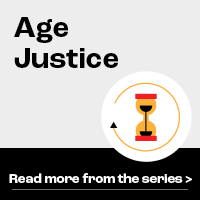
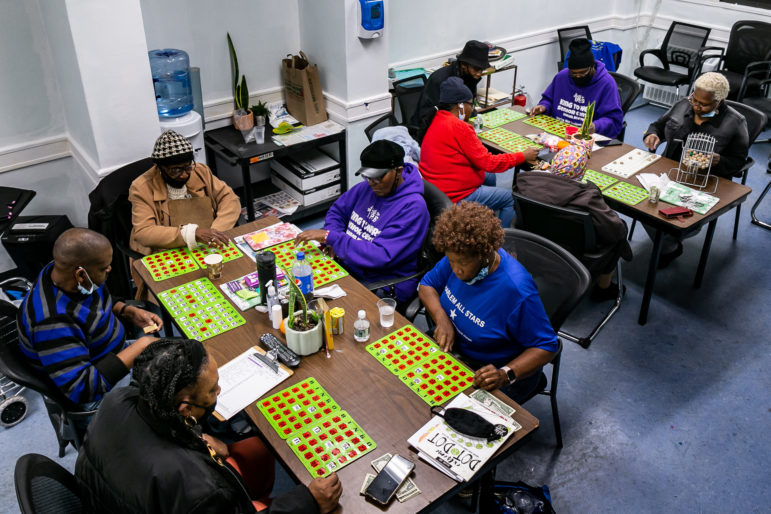
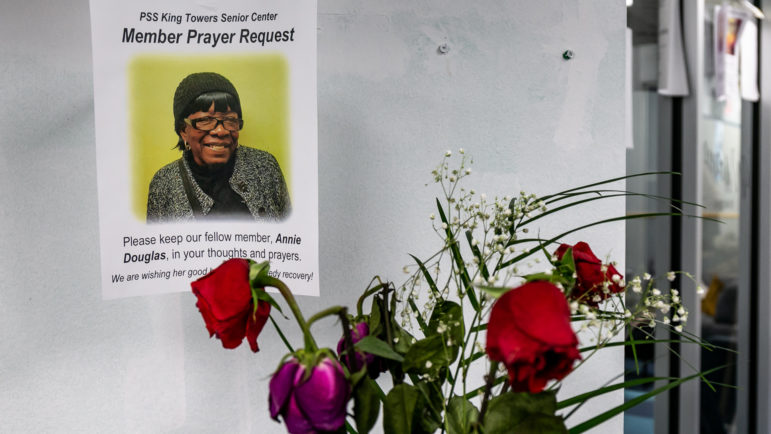
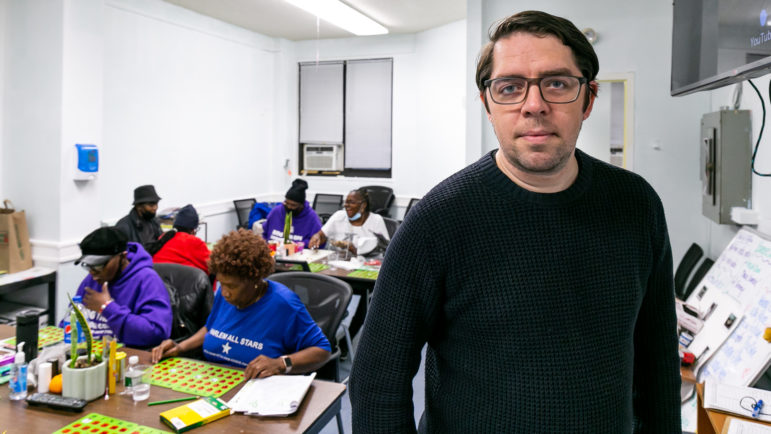
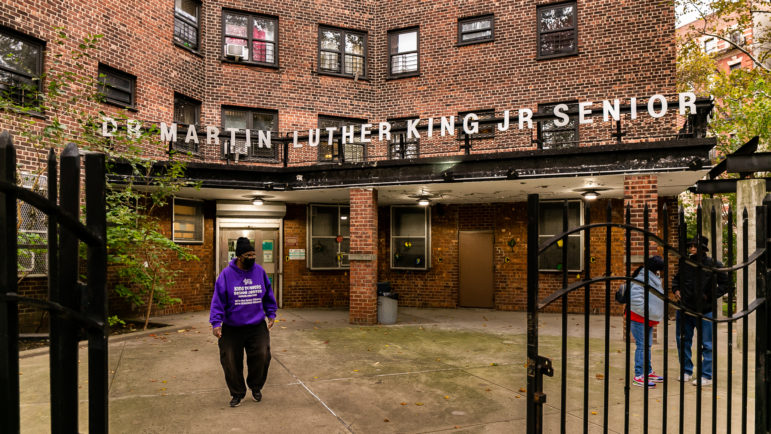
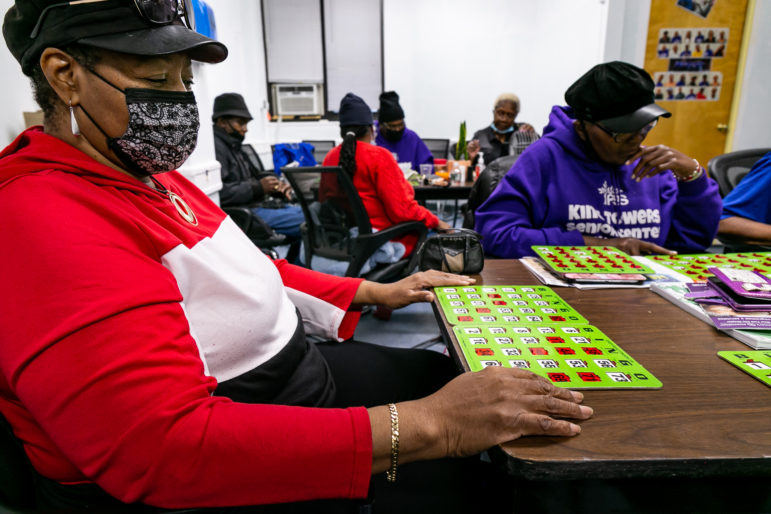
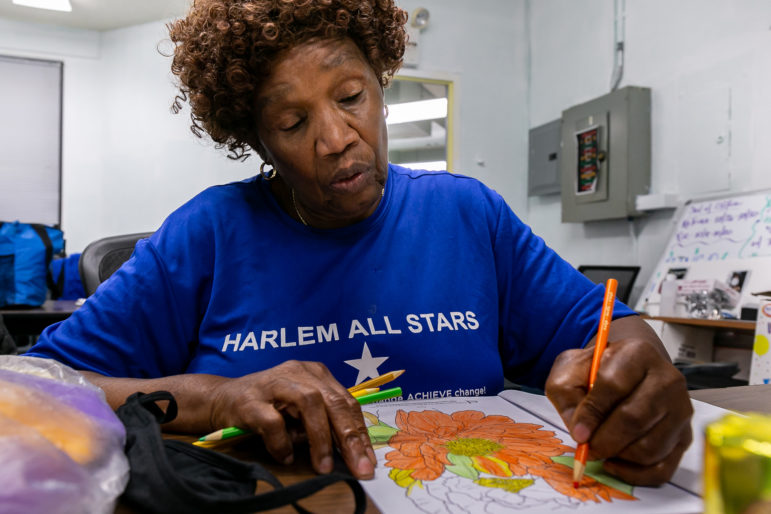







2 thoughts on “After Pandemic Reopening, NYC Senior Centers Adjust to New Normal”
My name is Isabelle Wilson and I’m the oldest senior at PSS King Towers. It was a pleasure reading about my center, why I call it my center is: I’m one of the original senior when it opened. However, since I have trouble walking, I do not attend as I would like, but I attend when I can.
I hope my intention will be shared and will reverberate from here.
Is there any non profit Senior Center here in New York City that can benefit a pro bono Physical Therapist to help improve lives of the underserved seniors in the community?